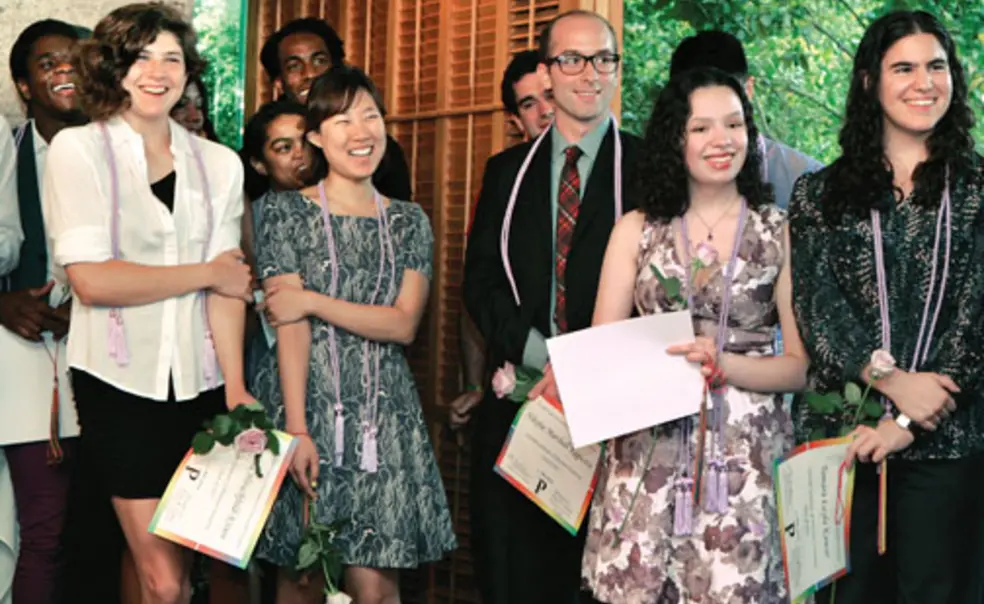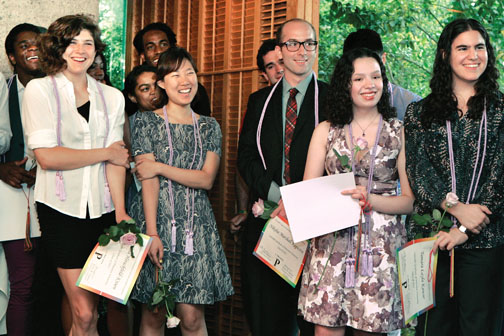Poignant graduation ceremony celebrates a revival of identity
Most of Princeton’s graduation events involve somber black robes or bright orange jackets, but Shehzad Ukani ’13 turned up at one of his graduation ceremonies wearing a black skirt suit, false eyelashes, and rhinestone-studded 5-inch heels — an “executive realness” outfit, in drag lingo. Even his Commencement robes were a little different, decorated with purple cords and rainbow-colored graduation-cap tassels.
Ukani was one of 45 seniors attending the LGBT Center’s Lavender Graduation, a May 13 ceremony at Prospect House that honored lesbian, gay, bisexual, transgender, and queer students and their allies in the graduating class. University students and members of the faculty, staff, and administration also received awards for service and leadership pertaining to LGBT issues and the Princeton community.
For Ukani, Lavender Graduation was a poignant representation of his own coming-out process as queer. Having only come “out” after the end of his sophomore year, Ukani explained, the event represented a sense of personal renewal and revival of identity.
“It was really special for me to be present in all my identities there: as a graduating Princeton student, as a person comfortable in drag, as a South Asian person,” he said.
Briana Wilcox ’13 expressed a similar sentiment, donning both the rainbow-colored tassels of the Lavender Graduation and the multi-colored stole of the Latino graduation at Commencement. “It’s a part of me that’s coming with me as I graduate,” she said. “I’m not just a Princeton student, I’m also representing these different communities.”
The ceremony occurred just a month after Every Voice, Princeton’s first conference for LGBT alumni — an event that Ukani said gave the Lavender Graduation special meaning because it represented the University’s “recalling people who often felt ostracized during their time at Princeton.”
Ricardo Brown ’13 cited a number of steps during his four years on campus that helped ensure the comfort of “anyone in the queer community who may not feel like they have a spot on campus.” These included the expansion of gender-neutral housing, coverage as of July 1 for gender-reassignment surgery in the University’s employee-health plan, and the establishment of Princeton AthleteAlly, the campus affiliate of a national program to create LGBT-safe spaces on sports teams.
Wilcox said that hearing others’ testimonies at the Lavender Graduation, however, made her see both “the wonderful things and the awful things,” and that much work remains to be done. “It felt more like a beginning than an ending,” she said. One key point, Brown said, would be a deeper understanding of the nuance in LGBT issues on campus — seemingly trivial actions or conversations can hold great meaning for others, he said.
Not all invitees attended Lavender Graduation, with some shying away for fear of having their photos appear on the Internet or avoiding the LGBT center for personal reasons.
But other students said that their sexual orientation or gender identity had played a substantial role in their Princeton lives. Brown, for example, explained that his sexual identity opened up for him a diverse set of academic projects related to queer history and culture.
“One of the greatest things I did at Princeton was coming out,” Mohit Manohar ’13 said. “It didn’t affect my friendships, didn’t affect my academics. I didn’t feel like a fraud all the time. It made my life much more free.”













No responses yet